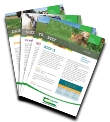
Beef Newsletter – July 2025
In this month’s edition: Midseason weighing matters Achieving liveweight gain at grass is one of the best ways to boost profit from finished cattle. The heavier your animals are at housing, the shorter the finishing period, which saves you time and money. Weighing for schemes Dairy-Beef Weighing Scheme Weight recordings for dairy-beef calves can be […]
08 July 2025
Type Newsletter
By Beef Specialist team
Download Publication (PDF)
In this month’s edition:
- Midseason weighing matters
Achieving liveweight gain at grass is one of the best ways to boost profit from finished cattle. The heavier your animals are at housing, the shorter the finishing period, which saves you time and money. - Weighing for schemes
- Dairy-Beef Weighing Scheme
Weight recordings for dairy-beef calves can be submitted now to the Irish Cattle Breeding Federation (ICBF) under the ‘Dairy Beef Weighing Scheme’ tab as part of the 2025 Scheme – deadline November 1. - SCEP – weighing action
Liveweights of cow and calf pairs can be submitted to the ICBF as part of the Suckler Carbon Efficiency Programme (SCEP) – on the tab ‘Record Calf and Dam Weights (Yr3)’.
The calf must be over 50 days of age and not yet weaned. The ideal time to weigh is when the majority of calves are five to eight months old. Weights need to be submitted to the ICBF by November 1.
- Dairy-Beef Weighing Scheme
- Upcoming events
- DairyBeef 500 Farm Walk
A farm walk will take place on Thursday, July 10, at 7pm at Charlie and Charles Smyth’s farm in Virginia, Co. Cavan (eircode: A82 DA00). Attendees will learn about dairy beef production including calf health, grassland management, parasite control, selecting heifers for finishing, and system profitability. - Future Beef Farm Walk
This farm walk takes place on Friday, July 25, at 6pm at Kay O’Sullivan’s farm in Mourneabbey, Mallow, Co. Cork (eircode: P51 Y62D). Attendees will learn about organic suckler beef production from a grass-based system.
- DairyBeef 500 Farm Walk
- Research update – Methane mitigation
Stuart Kirwan provides an update on methane mitigation feed additives. Feed additives will be critical in meeting this target, but must meet strict criteria: proven and consistent methane reductions; suitable delivery methods; inclusion in national inventories; safety; no food residues; no negative impact on animal performance or palatability; cost-effectiveness; and, ideally should be natural and compatible with other additives. Only Bovaer (3-NOP) and the red seaweed Asparagopsis taxiformis have consistently achieved methane reductions over 20%, although concerns remain regarding the seaweed’s impact on rumen health and residue levels. Teagasc and the University of Galway are also exploring calcium peroxide-based compounds, with methane reduction results ranging from 10-30%. - Health & Safety – Children farm safety webinar
With children home from school, they are particularly vulnerable to dangers on the farm, like vehicles, livestock, and slurry pits. Children must be supervised at all times when they are on a farm. Teagasc recently produced an informative farm safety webinar for children, ‘Stay safe with Jessy’, which featured Agrikids. Jessy is the Teagasc farm safety mascot. Take time to show this to the young people in your life. Watch the webinar back here
